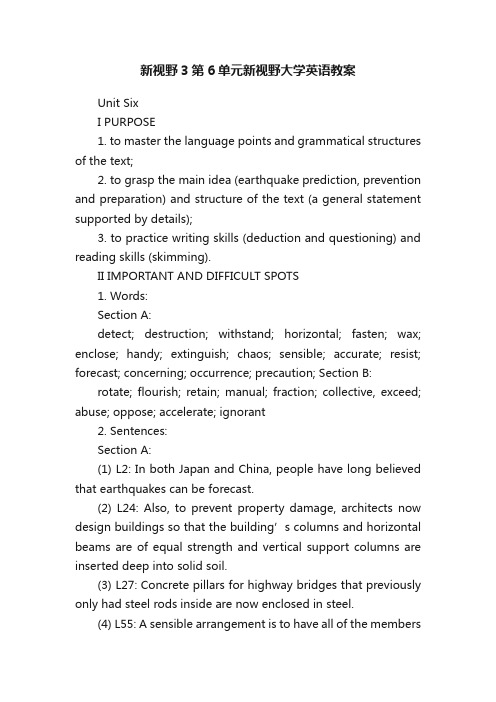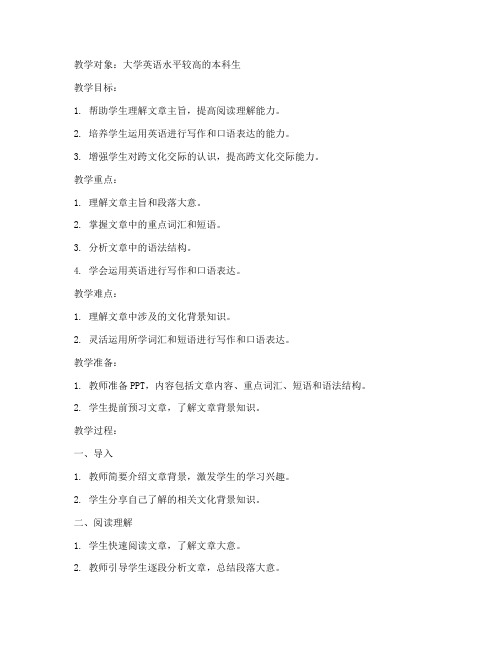新视野大学英语第三b4u6教案
新视野视听说(第三版)B4U6课件

Opening up
3 Newspapers often contain out-of-date information by the time they hit the shelves. I partly disagree with the third statement. It is true that newspapers can’t adapt as quickly as other types of media to breaking news events. However, there are advantages to having slower news. Newspaper journalists have time to digest information on an event, so they can write their reports with greater accuracy and details. It is less likely for newspapers to make mistakes although it takes longer time for an event to get reported. In contrast, reporting a news event immediately as it happens, as many online news websites are doing today, may lead to speculations (猜测) because the bigger picture is often unknown yet.
Listening to the world
Sharing
(推荐)新视野视听说(第三版)B4U6

E
F
Listening to the world
3 Watch Part 2 and match the people to the news media they use. 3 Radio
(See next page)
Opening up
3 Newspapers often contain out-of-date information by the time they hit the shelves. I partly disagree with the third statement. It is true that newspapers can’t adapt as quickly as other types of media to breaking news events. However, there are advantages to having slower news. Newspaper journalists have time to digest information on an event, so they can write their reports with greater accuracy and details. It is less likely for newspapers to make mistakes although it takes longer time for an event to get reported. In contrast, reporting a news event immediately as it happens, as many online news websites are doing today, may lead to speculations (猜测) because the bigger picture is often unknown yet.
新视野大学英语第三册教案

新视野大学英语第三册教案教案标题:《新视野大学英语第三册教案》教案目标:1. 帮助学生提高英语听、说、读、写的能力;2. 培养学生的跨文化交际能力;3. 培养学生的自主学习和合作学习能力;4. 培养学生的批判性思维和问题解决能力。
教学内容:1. 语法:复习和巩固基本语法知识,如时态、语态、虚拟语气等;2. 词汇:扩大学生的词汇量,学习和运用新词汇;3. 阅读:培养学生的阅读理解能力,提高阅读速度和技巧;4. 听力:提高学生的听力理解能力,培养听力技巧;5. 口语:提高学生的口语表达能力,培养流利、准确的口语表达;6. 写作:培养学生的写作能力,包括写作结构、语言表达和写作技巧;7. 文化:介绍英语国家的文化背景,培养学生的跨文化交际能力。
教学步骤:1. 导入:通过引入话题或图片等方式激发学生的学习兴趣;2. 预习:让学生在课前预习相关内容,提前了解课文主题和词汇;3. 听力训练:通过听力材料,帮助学生提高听力理解能力;4. 阅读训练:通过阅读材料,培养学生的阅读理解能力和阅读技巧;5. 语法讲解:通过语法讲解,帮助学生掌握和巩固语法知识;6. 口语练习:通过角色扮演、对话练习等方式,提高学生的口语表达能力;7. 写作训练:通过写作练习,培养学生的写作能力和写作技巧;8. 小组讨论:组织学生进行小组讨论,培养学生的合作学习能力和批判性思维;9. 总结与复习:总结本节课的重点内容,并进行复习。
教学评估:1. 课堂表现:观察学生在课堂上的参与度、表达能力和合作精神;2. 作业评估:批改学生的作业,评估学生的语言运用和写作能力;3. 考试评估:通过考试测试学生的听、说、读、写能力。
教学资源:1. 教材:《新视野大学英语第三册》教材及配套练习册;2. 多媒体设备:投影仪、电脑等用于播放听力和展示教学资源;3. 音频材料:提供课堂听力训练和学生自主听力训练的音频材料;4. 练习题:准备相关的练习题,用于课堂练习和作业。
新视野大学英语第三册教案unit6

(通过让学生回答与课文相关的问题,检查学生预习情况及课文内容的掌握情况)
精讲课文
讲解课文主要内容及课文结构
教
学
内
容
与
教
学
过
程
3. Study of language points (new words, expressions and typical sentence patterns)
II. Topic understanding: (lead-in of section A)
Watch a video clip ofTangshan Earthquake.
At 3:42 a.m. on July 28, 1976, a magnitude 7.8 earthquake hit the sleeping city ofTangshan, in northernChina. The very large earthquake, striking an area where it was totally unexpected, obliterated the city of Tangshan and killed over 240,000 people—making it the deadliest earthquake of the twentieth century.
3) The two sides _______________ the date of negotiation.
Key: agreed to agree with have agreed on
8. be resistant to (L.64)
offer resistance to
保守的人通常反对变化。
新视野视听说(第三版)B4U6

.
Learning objectives
1
talk about different forms of news media
2
learn how to follow a narrative in listening
3
learn how to add emphasis in speaking
Sharing
3 Watch Part 2 and match the people to the news media they use. 1 Newspapers
E
F
2 Television
B
E
.
Listening to the world
Sharing
3 Watch Part 2 and match the people to the news media they use. 3 Radio
1 The huge amount of advertising makes people want too much.
2 People can learn as much by watching television as they can by reading books.
3 Newspapers often contain out-ofdate information by the time they hit the shelves.
(See next page)
.
Opening up
3 Newspapers often contain out-of-date information by the time they hit the shelves. I partly disagree with the third statement. It is true that newspapers can’t adapt as quickly as other types of media to breaking news events. However, there are advantages to having slower news. Newspaper journalists have time to digest information on an event, so they can write their reports with greater accuracy and details. It is less likely for newspapers to make mistakes although it takes longer time for an event to get reported. In contrast, reporting a news event immediately as it happens, as many online news websites are doing today, may lead to speculations (猜测) because the bigger picture is often unknown yet.
新视野3第6单元新视野大学英语教案

新视野3第6单元新视野大学英语教案Unit SixI PURPOSE1. to master the language points and grammatical structures of the text;2. to grasp the main idea (earthquake prediction, prevention and preparation) and structure of the text (a general statement supported by details);3. to practice writing skills (deduction and questioning) and reading skills (skimming).II IMPORTANT AND DIFFICULT SPOTS1. Words:Section A:detect; destruction; withstand; horizontal; fasten; wax; enclose; handy; extinguish; chaos; sensible; accurate; resist; forecast; concerning; occurrence; precaution; Section B: rotate; flourish; retain; manual; fraction; collective, exceed; abuse; oppose; accelerate; ignorant2. Sentences:Section A:(1) L2: In both Japan and China, people have long believed that earthquakes can be forecast.(2) L24: Also, to prevent property damage, architects now design buildings so that the building’s columns and horizontal beams are of equal strength and vertical support columns are inserted deep into solid soil.(3) L27: Concrete pillars for highway bridges that previously only had steel rods inside are now enclosed in steel.(4) L55: A sensible arrangement is to have all of the membersof the family call to check in with a friend or relative who lives more than a hundred miles away. Section B:(1) L3: In other words, things in nature are large or small, new or old, only in accordance with the measures and the comparisons involved.(2) L43: Should people use it up to manufacture petrol for automobiles?(3) L61: What causes the acid rain that forms from water passing through polluted air?(4) L66: Now that they are no longer ignorant of the causes of the sickness of ourplanet, they seek ways to help the Earth, to give back what they take away.III PROCEDURE1. Warming-up activities;2. Introduction to the passage (general questions on the passage);3. Text analysis (structure and language points);4. Writing skills;5. Summary;6. Assignment.IV TIME NEEDEDSection A: (Total: 135mins)1. Warming-up activities: 5mins.2. Introduction to the passage: 5mins.4. Text Analysis: 70mins.4. Writing skills: 5mins.5. Summary: 5mins.6. Exercises: 45mins.Section B: (Total: 45mins)Reading skills: 7mins.Text study: 35minsSummary: 2mins.Assignment: 1 min.SECTION AHow to Prepare for EarthquakesPART ONEPRE-READING / WARM-UP (LISTEN AND TALK))1. Have you ever been in an earthquake? Describe an earthquake briefly which you have experienced or heard of.2. What would you do if you experienced an earthquake? What would do first if the room started to shake?3. To introduce related background information of earthquake.PART TWOGENERAL QUESTIONS ON THE PASSAGE1. Can we predict earthquake? How?2. What are the effective measures to be taken when an earthquake occurs according to the author? What’s your opinion?3. Can we prepare for earthquake? How?4. In your opinion, how important is the earthquake education?PART THREE A Detailed Study of TextPart OnePara. 1:1. watch for (Para.1, line3) : look at or observe sth. for; search for; look or wait attentively fore.g.: They are watching for the right moment.CF: watch for: to wait patientlywatch sth. for: to look at or notice sth.watch out: look out2. In Japan, scientists have wired the Earth and sea to detect movements. (Line 3) Meaning: In Japan, scientists have placed wires on the Earth and in the sea to discover the movements of the surface of the Earth.detect: notice, discovere.g.: Small quantities of poison were detected in the dead man’s stomach.e.g.: I detected a slight change in his attitude3. freeze to death (Para.1, line7):other phrases: bleed to death; starve to death; burn to death; work to deathCF: put sb. to death; shoot sb. to deathbe scared/ bored/ tired/ sick to death4. a school of fish (Para.1, line8) : a group of fishThe sound of his music attracted a school of dolphins.Other phrases like this one are: a herd of cattle/ a flock of sheep, birds/a swarm of bees, insects/ a pack of wolves, bounds猎狗/ an army of ants5. wax (Para.1, line13):v. increase , growe.g.: The popularity of the film stars waxed and waned. 名望盛衰无常n. 蜡a wax candle 蜡烛Part TwoPara. 2:6. after all (Para.2, line15): (1) (used for reminding sb. of acertain fact) it must beremembered(2) in spite of everythinge.g.: After all, an actor’s life is spent working with words.别忘了,演员的生活就是与语言打交道的。
新视野大学英语第三版B4U6教案

教学对象:大学英语水平较高的本科生教学目标:1. 帮助学生理解文章主旨,提高阅读理解能力。
2. 培养学生运用英语进行写作和口语表达的能力。
3. 增强学生对跨文化交际的认识,提高跨文化交际能力。
教学重点:1. 理解文章主旨和段落大意。
2. 掌握文章中的重点词汇和短语。
3. 分析文章中的语法结构。
4. 学会运用英语进行写作和口语表达。
教学难点:1. 理解文章中涉及的文化背景知识。
2. 灵活运用所学词汇和短语进行写作和口语表达。
教学准备:1. 教师准备PPT,内容包括文章内容、重点词汇、短语和语法结构。
2. 学生提前预习文章,了解文章背景知识。
教学过程:一、导入1. 教师简要介绍文章背景,激发学生的学习兴趣。
2. 学生分享自己了解的相关文化背景知识。
二、阅读理解1. 学生快速阅读文章,了解文章大意。
2. 教师引导学生逐段分析文章,总结段落大意。
3. 学生回答问题,巩固对文章的理解。
三、词汇和短语学习1. 教师讲解文章中的重点词汇和短语,并举例说明其用法。
2. 学生跟读、模仿,加深对词汇和短语的印象。
3. 学生进行词汇和短语填空练习。
四、语法结构学习1. 教师讲解文章中的语法结构,如时态、语态、从句等。
2. 学生进行相关语法练习,巩固所学知识。
五、写作和口语表达1. 教师引导学生分析文章的写作结构,总结写作技巧。
2. 学生根据所学知识,撰写一篇与文章主题相关的短文。
3. 学生进行口语表达练习,分享自己的写作思路。
六、课堂小结1. 教师总结本节课所学内容,强调重点和难点。
2. 学生提出疑问,教师进行解答。
七、课后作业1. 完成本节课的写作和口语表达练习。
2. 预习下一节课的内容。
教学反思:本节课通过阅读理解、词汇和短语学习、语法结构学习、写作和口语表达等环节,帮助学生提高英语综合运用能力。
在教学过程中,要注意以下几点:1. 关注学生的个体差异,因材施教。
2. 营造轻松、愉快的课堂氛围,激发学生的学习兴趣。
新视野视听说(第三版)B4U6 PPT

Listening to the world
Sharing Listening Viewing
Listening to the world
Sharing
1 Watch a podcast for its general idea.
In the podcast, people are interviewed about the media and the news. They talk about how they usually get their news, what kind of news stories interest them the most, how modern technology and new media has changed their relationship with the news, and whether the media uses its power responsibly.
(See next page)
Opening up
3 Newspapers often contain out-of-date information by the time they hit the shelves. I partly disagree with the third statement. It is true that newspapers can’t adapt as quickly as other types of media to breaking news events. However, there are advantages to having slower news. Newspaper journalists have time to digest information on an event, so they can write their reports with greater accuracy and details. It is less likely for newspapers to make mistakes although it takes longer time for an event to get reported. In contrast, reporting a news event immediately as it happens, as many online news websites are doing today, may lead to speculations (猜测) because the bigger picture is often unknown yet.
- 1、下载文档前请自行甄别文档内容的完整性,平台不提供额外的编辑、内容补充、找答案等附加服务。
- 2、"仅部分预览"的文档,不可在线预览部分如存在完整性等问题,可反馈申请退款(可完整预览的文档不适用该条件!)。
- 3、如文档侵犯您的权益,请联系客服反馈,我们会尽快为您处理(人工客服工作时间:9:00-18:30)。
新视野大学英语读写教程第四册教案B4U6Gender Equality*Teaching Objectives:Students will learn to use English to1. To talk about gender equality2. To further understand the text3. To apply the phrases and patterns4. To master the essay writing skill*Time Allotment: each unit 8 classes1st---2nd classes: Part I Warming up1.Lead-in : Guessing activity2.Pre-reading activities: Answer the questions3.Cultural background: Watch the video and fill in the blanks3rd--4th classes:Part II Text Study4.Reading in Depth: Structure Analysis, Summary, Difficult sentencesanalysisnguage Focus: More practice in Language Points (language pointsexplanation, Sentence Patterns, Useful Expressions)5th—6th classes:Part III Reflection6.Critical thinking: More speaking practice in discussion related togender equality7.Writing Practice: Essay writing• Write an essay with your personal experiences.7th—8th classes: Part IV Assignment7. Post-reading activities: summary of useful expressions, watching and discussing, speaking task, etc.8. Section B: Focus on fast reading and practice in reading skillUNIT 6Section A The weight men carryPart I Warming up1. Lead-in:To separate the words:Which words are always used to describe the men/women?Men: clean-cut, stylish, sharp, robust, virileWomen: cute, sexy, pretty, delicate, elegant2. Pre-reading activities:1) Can you list some jobs for women and some jobs for men?Women :nurse, teacher, office lady, assistantMen:soldier, architect, firefighter, mineworker2) Why is there a difference between men and women in choosing a job?Tips :Difference:Men are physically stronger. So they can do some jobs that require physical strength and power.Women are more subtle. So they can do some jobs that require carefulness and patience3. Cultural Background:Watch the video and fill in the blanks as the following sentences.• 1. In 2009, 60 % of graduates from Universities are females in OECD areas. By 2025 , 70 % of graduates are females inthose areas.• 2. 70 % of education graduates are women, 75% of health and social science graduates are women. While, 70% of engineering manufacturing , construction graduates are men.• 3. On the pay-slip (工资单),women's pay are always smaller than men’s. They average are 16 % smaller than men’s.• 4. In Norway, 40 % of board members are women. In Sweden, France and Finland, 15-20 % of board members are women. In Germany, Japan,Netherland , less than 5 % of board members are women.Part II Text Study1. Main idea & structure:Tips for Reading: A Good Reader should1) Try to become an active reader.2) Learn to ask more questions. ( what, why, how)3) Do the efficient reading. (key points, topic sentence, key words,locating words, necessary and sufficient )4) Develop a habit of marking during reading.Answer Questions1)What types of work did the author see men do in his hometown? (Para. 1)From morning to sundown:they built cabinets, dug ditches, mined coal, or drove trucks;they trained horses, stocked furnaces, made tires, stood on assembly lines, welding parts onto refrigerators or lubricating car engines.In the evenings and on weekends:they labored equally hard, working on their own small tract of land, fixing broken-down cars, repairing broken shutters and drafty windows.2) The bodies of the men I knew were twisted and wounded in ways _visible______ and _invisible_______. (Para. 2)Visible ways:Heavy lifting had given many of them spinal problems and appalling injuries.Racing against conveyor belts had given some ulcersome had broken ribs and lost fingers.Their ankles and knees ached from years of standing on concrete. Some had partial vision loss as the glow of the welding flame damaged their optic receptors.Invisible ways:All around us, the fathers always seemed older than the mothers.Men wore out sooner, being martyrs of constant work.3)What did they do when men worked as soldiers? (Para. 3)Tips:When the shooting started, many of them would die for their patriotism in fields and forts of foreign outposts. This was what soldiers were for – they were tools like a wrench, a hammer or a screw.4)What caused the author to be puzzled after he entered college? (Para. 5)Tips:The author was puzzled at women’s claim th at men enjoy greater joys and more privileges. This was because he knew from his own experiences that men did much harder work and suffered much more than women.5)What kind of examples the author used to defend for men? (Para. 5)Tips:The right to work five days a week, 12 months a year, for 30 or 40 years, wedged in tight spaces in the textile mills, or in the coal mines, struggling to extract every last bit of coal from the rock-hard earth? The right to die in war? The right to fix every leak in the roof, every gap in the fence? The right to pile banknotes high for a rich corporation in a city far away? The right to feel, when the lay-off came or the mines shut down, not only afraid but also ashamed?6)Why did the author envy women? (Para. 6)They were interested in art or music or literature, and enjoy a sense of ease.They did not have to go to war.The space of their comparatively lightweight work seemed expansive. • They clipped coupons, went to see neighbors, or ran errands at school or at church.7)Why did the women in the author’s college see him as an enemy? (Para. 8)They were the daughters of privileged, Republican men and they wanted to inherit their fathers’ power and lordship over the world. They longed for a say over their future. An d because of the author’s sex, as destined from birth to become like their fathers, so they see him as an enemy.8)What kind of role the author wanted to play? (Para. 8)Tips: The author thinks that the miserable life of the lower class people is similar to the gender inequality that women suffer from. He supports the fight against social inequality, no matter whether it is related to class or gender.Structure Analysis:Introduction:Men labored all day and had little free time. (Para. 1)The bodies of men were twisted and wounded because of hard work. (Para. 2)Men were soldiers who had to die in war. (Para. 3)The lives of rich men who had power and privileges seemed remote and unreal. (Para. 4)Major arguments and supporting detailsWomen’s criticism o f men was puzzling because men in reality had to work hard to support their household.(Para. 5)Women’s grievances were hard to understand because women had an easier life than men. (Para. 6)The fates of lower-class men and women are equally bleak and grim. (Para. 7)Conclusion:Women have grievances about gender inequality because they don’t know the hard life of working-class men.2. Language Focus:Useful expressions:1)Off (the ) gridNot connected to public utilities and having your own power and water supply.远离公共设施的,自给自足的我们住在那里远离水电,生活全靠自己。
